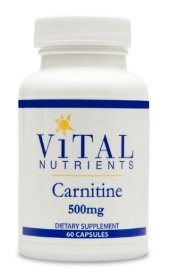What Is L-Carnitine and How Do I Increase It?
L-carnitine is an amino acid, which is the name for a large class of molecules that perform vital functions in your body. It is partly synthesized by your body and partly obtained from the diet. It is also available as a nutritional supplement.
Free PCOS Newsletter
It occurs naturally in animals, plants and microorganisms. Generally, plants contain small amounts compared to animals, where especially high levels may be found in heart and skeletal muscle.
The main function of L-carnitine is to help the body turn fat into energy. It is a "vitamin-like" molecule that helps to transport long-chain fatty acids from outside the mitochondria (the energy powerhouse of the cell) to inside the mitochondria, a process that is vital to energy production.
It vital role in energy production explains why so much of it is concentrated in your heart muscle, which needs to continually produce energy in order to keep beating. If carnitine levels drop too much, risk of a heart attack is much increased.
It's available as a nutritional supplement. Medical research suggests that it could be beneficial for some of the symptoms that PCOS women tend to have.
How Can I Increase My Levels of Carnitine?
Highest dietary concentrations are found in red meat and dairy products. Lesser amounts are found in plant foods.
However, eating a lot of red meat and dairy can create problems. For example, these foods are high in saturated fat. Too much saturated fat can force your adrenal glands to produce more male hormones. Excessive male hormones are a big reason why you have polycystic ovary syndrome.
For this and other reasons, it may be advisable to take a supplement.
Carnitine is also manufactured in the body from lysine (an essential amino acid) in the presence of methionine (an essential amino acid), vitamin C, vitamin B-6, niacin and iron. However, your body may not produce enough of it so you would need to get more from your diet or a supplement.
Is Supplementation Safe -- and How Much Should I Take?
It is safe with no significant side effects reported in human studies.
Avoid the D-form of carnitine, which interferes with the natural L-form, which can result in carnitine deficiency in heart and skeletal muscle, and in exercise intolerance in patients with chest pain.
The maximum safe dosage has not been established for pregnant or nursing women, young children or people with severe kidney or liver disease. People on hemodialysis should not use carnitine unless prescribed by their doctor.
There are no known adverse interactions with any drug or nutrient. Anti-seizure medications may increase carnitine needs.
Need for this nutrient varies greatly among individuals. Some clinicians suggest a dosage of 500-1000 mg three times daily or as directed by your healthcare professional.
Note about Pregnancy and Infant Nutrition
The placenta actively transports carnitine to the fetus, where the fetus's ability to synthesize it is not fully developed. Pre-term infants may benefit in weight gain and growth from extra carnitine. However, pregnant women tend to be low in serum carnitine.
Carnitine in breast milk is more "bioavailable" to an infant than in infant formulas. Infants have a limited ability to fully create their own carnitine, so adequacy of this nutrient is something to think about if you are contemplating a pregnancy or have a baby. If you have any questions about carnitine adequacy or prenatal nutrition, consult with your doctor.
Where Can You Get It?
High quality L-carnitine in 500 milligram capsules is available from our online PCOS Supplements Store.
Related Articles
Click here for article footnotes.
Get Answers to your Questions about
- Fertility
- Weight Control
- Hair Loss
- Stress
- Unwanted Hair
- Acne...and more!
FREE PCOS Report
and Newsletter

Your email is safe with us. We respect your privacy, and you may unsubscribe at any time.
Recent Articles
-
PCOS Long Journey to The Happy End
Apr 30, 18 07:24 PM
Hi Girls, Maybe my story will have one day a good end but I am not there yet. Until I was 31 years old I lived my dream, having lovely husband, good -
PCOS and Miscarriage
Apr 17, 18 04:03 PM
Proper diet and natural supplements can help the body maintain a pregnancy through successful delivery.
-
How to Deal with PCOS and Stress
Apr 04, 18 04:19 PM
Your body has a natural capacity to heal itself if you provide it with the necessary tools.






